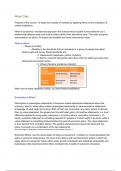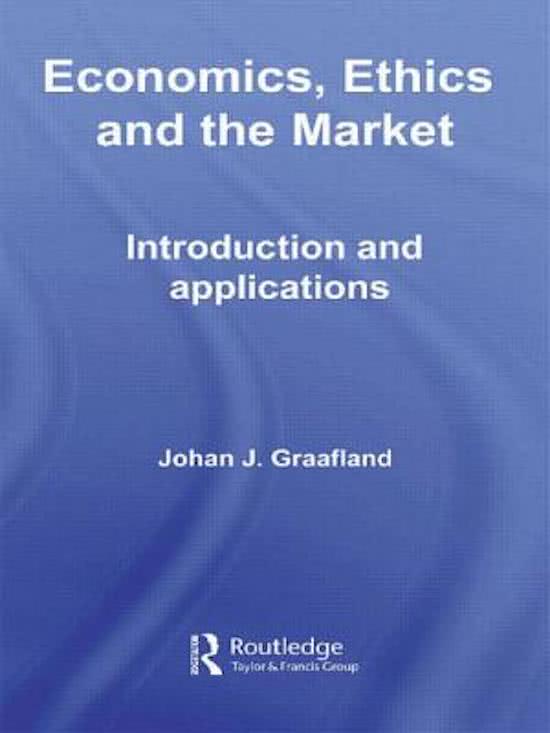Week One:
Purpose of the course: To study the morality of markets by applying ethics to the evaluation of
market institutions.
What is economics: neoclassical approach: the science which studies human behavior as a
relationship between ends and scarce means which have alternative uses. The ends are given,
disconnection w/ ethics. All means are tradable and have instrumental value.
What is ethics?
→ Study of morality
→ Morality is the standards that an individual or a group of people has about
what is right and wrong. Moral standards are:
=> Values/ends (happiness, justice, freedom)
=> Norms: concrete behavioral rules (thou shall not steal) (you also have
behavioral and social norms).
=> Virtues (honesty, prudence, industry)
When two of these standards collide, you have these possibilities!
Economics vs Ethics:
Descriptive vs prescriptive statements. Economics makes descriptive statements about the
economy ‘what is’ while ethics makes prescriptive statements or value/normative statements,
knowledge of what ought to be done. Both of them are connected, any policy advice is derived
from (a) value statement: the government should foster goal x (b) positive statements: x is most
efficiently realized by using policy instrument y (c) policy advice: use policy instrument y. To
clarify, a positive statement is something relevant to questions of what ought to be done, while a
value statement is something that prescribes the goal of economic policy. The value statement
is thus derived from normative theory. The positive statement thus shows the facts and the
policy conclusion is a combination of the two statements.
Note: see slides for examples on these, he shows two of them (slides 10 and 11)
Economic Ethics: has the same object of study as economics. It reflects on moral standards that
apply to economic phenomena. We have micro-ethics and macroeconomic ethics in which we
apply ethics to economics. Micro-ethics looks at both individuals and individual households and
businesses while macroeconomic ethics considers the morality of economic structures.
,Macroeconomic ethics needs micro-ethics. Macroeconomic ethics belongs to a broader
category of social ethics.
On what values are the classical defenses of the free market based?
John Locke: the free market economy respects the right to freedom and right to private
property (lockean proviso). The government should not be allowed to intervene in economic
transactions that individuals voluntarily conclude on the market.
Adam Smith (utilitarian defense): the free market economy will produce the greatest
benefits.
→ Market allows labor division. Labor division generates higher productivity and
innovation.
→ Prices tend to the lowest possible level in a competitive market.
→ Competition generates efficient allocation through price signals.
Since Adam Smith, income has been rising dramatically.
Theory of unintended consequences: basically he argues that one who follows his own -interest,
an invisible hand leads him to promote an end which was not a part of his intention. Hence, he
says that if everyone pursues their own -interest, then that of society will also be met.
Criticism of the free market economy.
(1) Lack of efficiency: companies have an incentive to reduce competition. Negative
externalities (e.g. pollution) → interest is not always socially efficient. Bounded
rationality. Conflicting interests that change over time will make it difficult to make a
consistent choice.
(2) Lack of other ethical values. → Injustice: free markets generate unequal income
distribution (Piketty). Furthermore, the assumption that people have rights to liberty and
property is unproven. Markets only respect certain negative rights. They respect the right
of freedom of consent and freedom from coercion. However, See page 8 middle from
book for example on when a negative right can be hindered by a positive right.
Two Models of Capitalism:
=> Anglo Saxon Model (UK,US)
→ Free market operation
→ Government secures private property and contract rights, but doesn’t
intervene or regulate the economic process.
→ Shareholder model for companies: max stock value (bonus system for
managers).
=> Rhineland Model (Germany, France).
→ Market operation, but within some limits.
→ Government regulates the market and provides for welfare state
→ Stakeholder model for companies: balance of interests of stakeholders.
- Stakeholders => Shareholders/Employees/Customers/Suppliers/Governments/Society
, Week Two:
Utilitarianism:
The greatest happiness of the greatest number (Jeremy Bentham). He argued that an
action is right, if and only if the sum of total utilities produced by that act is greater than the sum
of total utilities produced by another act the agent could have performed in its place. There are
three characteristics to utilitarianism:
(1) Consequentialist theory: this means that it judges the ethical valuation of a policy only in
terms of consequences.
(2) Welfarism: the only goal is utility/welfare. There are types of welfarism:
(a) Bentham: Utility is pleasure (hedonism/monism)
(b) Economists: Utility is satisfaction of actual preference (individual sovereignty:
individuals are the best judges of their own welfare.
(3) Sum ranking: total sum of utilities should be maximized with equal weight to utility of
different individuals.
The capability approach is a theoretical framework that entails two normative claims: first, the
claim that the freedom to achieve well-being is of primary moral importance and, second, that
well-being should be understood in terms of people's capabilities and functionings (Sen).
Steps to cost-benefit-analysis:
(1) Who is affected and how?
(2) How much are they willing to pay for each policy? If they are negatively affected, what
compensation do they require?
(3) Determine the sum of these and choose that which has the highest net benefit! We must
compare the situation with the next best course of action!
Note: The slides have a good example about e-waste.
Criticism on Utilitarianism:
Consequentialism No importance is attached to the fulfillment of rights. In other words, it
can violate individual rights. Basically, one can suffer as long as net
benefit is positive. It ignores considerations of retributive justice (the just
imposition of punishments upon those who do wrong), it also does not
look in the past. If you kill someone, it is not ok to punish you, as you
would lead to more pain. It is also difficult to test preferences as they
are subjective.
Welfarism Happiness is not the only relevant argument in an evaluation of an
action or policy. Also, utility is not the best representation of well-being.
Thirdly, it also assumes that different values are reducible to one basic
value, namely utility. SEE BOOK FOR 4th REASON! The fifth problem
is that it assumes that people are rational. However, rationality is a
strong assumption. People may prefer something that is bad for them
due to ignorance. E.G. drinking. Also preferences of leaders can be
perverse.






